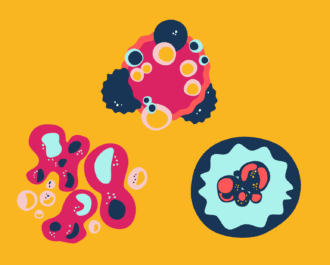
A new study by NBCF-funded researcher and Endowed Chair Professor Sherene Loi offers hope to people with advanced Human Epidermal Growth Factor Receptor 2 Positive (HER2+) breast cancer, with initial findings suggesting a new combination therapy could significantly improve patient outcomes.
Up to 1 in 5 of all breast cancer cases are HER2+ meaning the breast cancer cells produce excessive amounts of the HER2 protein, which promotes the growth of this type of breast cancer.
People with HER2+ breast cancer are usually treated with trastuzumab (brand name Herceptin), a highly effective drug that specifically targets the HER2 protein to stop the breast cancer cells from growing. Unfortunately, some people develop resistance and relapse occurs because the resistant breast cancer returns and metastasizes (spreads) to other parts of their body.
The recent study led by Professor Loi is the first to investigate the interaction of tucatinib, a drug indirectly modulating HER2 in combination with drugs targeting the immune system in advanced HER2+ breast cancers in a preclinical model.
The immunotherapies used in the study called programmed cell death ligand-1 (PD-L1) and programmed cell death-1 inhibitor (PD-1) have poor efficacy in people with HER2+ breast cancer that is trastuzumab-resistant. There are currently no approved immunotherapies for people with this type of breast cancer and more research is needed to better understand the relationship of the immune system with HER2+ breast cancer.
Professor Loi explains, “The immune system has a key role to play in how tumours grow and progress. Immunotherapy is a promising treatment approach that targets the immune system rather than the tumour.”
Findings from the recent study showed that tucatinib strengthened the immune response targeting HER2+ breast tumours. This anti-tumour immune response was even better when the tumour models were treated with a combination of tucatinib and PD-L1 and PD1 immunotherapies.
The outcomes of this NBCF-funded study are the backbone for the Breast Cancer Trial (BCT) TUGETHER investigating how advanced HER2+ breast cancer can be treated. A clinical trial that combines tucatinib and PD-1/PD-L1 inhibitors has now been designed with the hope to prolong the duration of immune response in people with advanced HER2+ breast cancer that is trastuzumab resistant.
Professor Loi says, “Further research will focus on how the tumour immune microenvironment is altered with these therapies so that we can better understand how this can be leveraged for more effective treatment options and outcomes for patients.”
Recognised internationally as a leader of international clinical trials in breast cancer therapies, Professor Loi is a medical oncologist and cancer researcher whose work has led to a greater understanding of the relationship between the immune system and breast cancer cells.
Finding treatments to help stop deaths from breast cancer is one of four research objectives of our Pink Horizon Research Strategy.
Metastatic (advanced/stage IV) breast cancer is responsible for the nine lives lost to breast cancer every day in Australia. Treating hard-to-treat and metastatic breast cancers is essential to achieving our vision of Zero Deaths from breast cancer.
More News Articles
View all News


